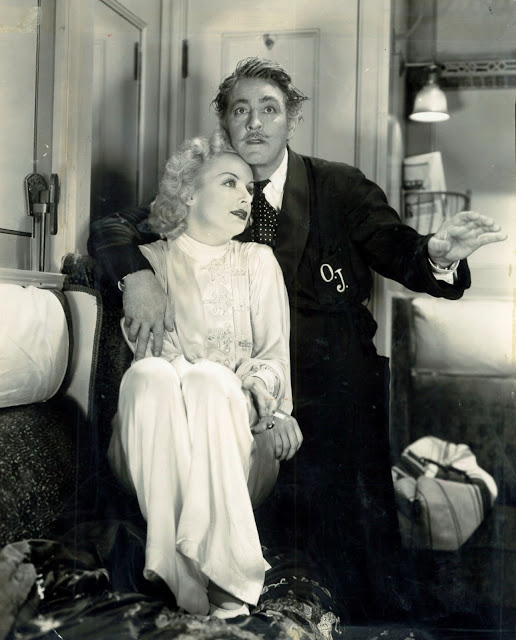Train Load Of Precode
20th Century (1934) Is Barrymore's Last Roar
It must have been quite something to sit in a theatre and watch a play about staging a play. 20th Century had been a major hit on Broadway, so was known quantity and a squeaker under lowering net that was fuller enforcement by the PCA (released May 1934). 20th Century improves for me on repeat viewings now that I'm reconciled to shouting that goes on throughout. Howard Hawks comedies had a habit of setting a pitch early on and maintaining it. That could mean set at high decibel, or early resort to speed that never flags. I've seen modern viewers exhaust fast on Hawks comedies. He might be credited as a screwball pioneer depending on your definition of screwball. Hawks did introduce a new wrinkle to comedy by using name stars as buffoons, per here with John Barrymore and Carole Lombard playing at clowns. We can see contradiction between what a public expected and what Hawks delivered by looking at posters for 20th Century, the leads depicted on glamour and romance terms for sell purpose, with no suggestion of manic performance both give in the film. 20th Century did $308K in domestic rentals, less than most
What standing the film acquired had to come much later. 20th Century became a property every actor sought to play. Television staged it often, once with Orson Welles and Betty Grable, a pairing I'd like to see if any kinescope exists. The 1934 20th Century profited more inside the industry than out, for however a public misunderstood or rejected it, there were definitely ideas here that could be refined, or better put, softened, by others who'd pursue the screwball concept. Hawks was like The Fountainhead's Howard Roark introducing a radical mold for colleagues to later chip at and re-form to fit H'wood convention. No screwball cast would be so uninhibited as Barrymore and Lombard here. Every performance she'd give was subtle drop from this, but again, how could any career with hope of sustaining do so at energy projected in 20th Century? For Barrymore it mattered less, for this was his last roar in a lead, and besides, he was known for try-anything and indifference to rigid image others might impose on him, JB long celebrated for range whereas
 |
| Mae West Endorses A 1933 Performance of the Play in Hollywood |
The "Oscar Jaffe" character was evidently based on several Broadway impresarios. Anyone who could mount repeated successes in this viciously competitive trade had to, by definition, be bigger than life. In fact, many such men were despised, especially by actors and others who jumped when they hollered. Was ever a Broadway personage depicted who was not utterly self-centered? Persistent image of players who have no identity outside of characters they enact is well maintained here. That's spelled out in dialogue referring to Carole Lombard's "Lily Garland." I've wondered if there was truth to such prevailing belief. More than a few have told me that actors are less real people than mere fictional ones they portray. How much did
















Comments
Post a Comment